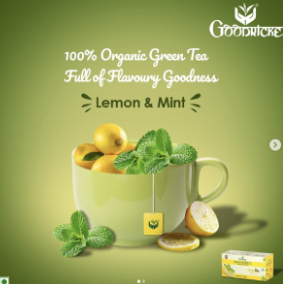What Is CTC Tea ?
CTC tea, which stands for “crush, tear, curl,” is a type of tea made from the leaves of the Camellia sinensis plant. It is a method of processing tea leaves that involves rolling, crushing, and curling them into small pellets.
The CTC method of processing tea leaves is different from other methods, such as orthodox or whole-leaf processing. CTC tea leaves are passed through a series of cylindrical rollers with sharp teeth that crush, tear, and curl the leaves.
This process helps to release the essential oils and compounds present in the tea leaves, resulting in a strong, robust, and flavourful cup of tea.
How Do I Develop a Taste for It?
Developing a taste for CTC tea is a process that takes time and experimentation. If you’re new to CTC tea or tea in general, start with milder variations to ease into the stronger flavors.
Adjust brewing parameters such as water temperature, steeping time, and tea-to-water ratio to find the flavour that suits your taste buds.
Adding milk and sweeteners can help balance the strong taste. Consider pairing CTC tea with complementary flavours and give it time, as taste preferences can evolve over time.
Developing a taste for CTC tea is a personal journey. Explore different types of teas and brewing methods to find what resonates with you. Embrace the experimentation and enjoy the process of discovering your preferred flavour profiles.
Is CTC Tea Good for Health?
CTC tea, like other varieties of black tea, can have certain health benefits when consumed as part of a balanced diet. Here are the potential health benefits associated with CTC tea:
- Antioxidant properties: CTC tea contains polyphenols and antioxidants that can help protect the body against free radicals, which are harmful molecules that can cause cell damage. Antioxidants are believed to have potential health benefits, such as reducing the risk of chronic diseases.
- Heart health: Studies suggest that regular consumption of black tea, including CTC tea, may have a positive impact on heart health. The antioxidants in CTC tea may help improve heart function, reduce the risk of cardiovascular diseases, and promote healthy blood pressure levels.
- Mental alertness: CTC tea contains caffeine, which is a natural stimulant that can improve mental alertness and focus. It may help increase energy levels and promote wakefulness.
- Digestive health: People find that CTC tea can aid digestion and relieve certain digestive issues. The tannins present in CTC tea can have a calming effect on the digestive system.
- Hydration: CTC tea is composed of water, which can contribute to hydration. Staying hydrated is essential for various bodily functions.
It is worthwhile to note that the impacts of CTC tea on one’s health can be influenced by factors such as the quality of tea, brewing methods, and lifestyle habits.
Types
Indian CTC teas are known for their strong flavour and are consumed in India and around the world. Here are the popular types of Indian CTC teas:
- Assam Tea: Assam is a region in northeastern India known for producing robust and malty black teas. Assam CTC tea is full-bodied, bold, and enjoyed with milk. It is commonly used in masala chai preparations.
- Darjeeling Tea: Darjeeling, located in the foothills of the Himalayas, is famous for its delicate and aromatic black teas. While Darjeeling teas are associated with orthodox processing, CTC variations are available. Darjeeling CTC teas have a unique flavour profile with muscatel notes and a bright, golden infusion.
- Nilgiri Tea: Nilgiri, a mountainous region in southern India, produces teas with a mellow and balanced flavour. Nilgiri CTC teas have a medium body and a brisk character, makDooars Tea: Dooars is a region in West Bengal, India, famous for its large tea estates. Dooars CTC teas are known for their strong and robust flavour, making them suitable for those who prefer a powerful cup of tea.ing them suitable for both hot and iced tea preparations.
- Kangra Tea: Kangra Valley in Himachal Pradesh, India, is known for its high-quality teas. Kangra CTC teas have a distinct flavour characterised by a balance of muscatel notes and floral undertones.
- Dooars Tea: Dooars is a region in West Bengal, India, famous for its large tea estates. Dooars CTC teas are known for their strong and robust flavour, making them suitable for those who prefer a powerful cup of tea.
- Bihar Tea: Bihar, a state in eastern India, is emerging as a notable tea-growing region. Bihar CTC teas offer a rich and malty flavour with a deep reddish infusion.
How to Make CTC Tea
Quick & easy, these steps will guide you on how to make a perfect cup of Goodricke CTC tea.
For this guide, we are using our Khaass Exclusive Assam Tea
Ingredients:
1 teaspoon of Goodricke Khass Assam Tea 1 cup of water Milk (optional) Sugar or sweetener (optional)
Instructions:
- Boil water: Bring water to a rolling boil in a saucepan or kettle.
- Add tea leaves: Once the water has boiled, add the CTC tea leaves to the boiling water. Use one teaspoon of tea leaves per cup of water, adjusting the amount to your preference for strength.
- Steep the tea: Allow the tea leaves to steep in the boiling water for 2 to 4 minutes. Adjust the steeping time based on how strong you want the tea to be. Longer steeping time will result in intense flavour.
- Strain the tea: After steeping, strain the tea to remove the tea leaves. You can use a tea strainer or a fine mesh sieve for this purpose.
- Add milk and sweeteners (optional): If desired, you can add milk and sweeteners to your taste. CTC tea is enjoyed with milk and sugar. Add a splash of milk and sugar or any preferred sweetener and stir well.
- Serve and Enjoy: Pour the prepared CTC tea into a cup or teapot. You can serve it as is or garnish it with spices like cinnamon or cardamom for added flavour. Enjoy your hot cup of CTC tea!
CTC Tea and Weight Loss
CTC tea, like other types of tea, can support weight loss efforts as part of a balanced diet and healthy lifestyle. Here are a few ways in which CTC tea may contribute to weight management:
- Low in calories: CTC tea itself is low in calories when consumed without added milk or sweeteners. Choosing unsweetened CTC tea can be a calorie-conscious choice compared to other sugary beverages.
- Caffeine content: CTC tea contains caffeine, a natural stimulant that can increase energy expenditure and enhance fat oxidation. Caffeine may help improve exercise performance, allowing for potentially greater calorie burn during physical activity.
- Boosting metabolism: The compounds present in tea, including CTC tea, such as catechins and polyphenols, may have a modest impact on metabolism and fat oxidation. These compounds can help increase the body’s metabolic rate and support weight management.
- Replacing high-calorie beverages: Choosing CTC tea as an alternative to high-calorie and sugary drinks like sodas, energy drinks, or sugary coffee beverages can help reduce calorie intake. Swapping these calorie-dense beverages for a cup of CTC tea can contribute to a calorie deficit, which is important for weight loss.
- Promoting hydration: Staying well-hydrated is essential for health and weight management. CTC tea, when consumed without milk or excessive sweeteners, can contribute to your daily fluid intake and help maintain hydration.
Caffeine Content in CTC Tea
CTC tea contains a moderate to high level of caffeine compared to other types of tea. However, the exact caffeine content can vary depending on factors like the specific tea leaves used, the brewing method, and the steeping time.
On average, a cup (8 ounces or 240 ml) of CTC tea can contain approximately 40–70 milligrams of caffeine. This amount is lower than the caffeine content found in a cup of coffee, which ranges from 95 to 200 milligrams per cup.
Caffeine sensitivity varies among individuals, and people may be more sensitive to its effects than others. Factors such as body weight, metabolism, and individual tolerance can influence how caffeine affects each person.
If you are sensitive to caffeine or have specific health concerns, it is advisable to moderate your consumption of CTC tea or opt for decaffeinated tea alternatives. Decaffeinated CTC tea is available and can be a suitable option for those seeking to reduce their caffeine intake while enjoying the flavour of CTC tea.
It’s always a good idea to be mindful of your caffeine consumption and listen to your body’s responses. If you have any concerns or questions about caffeine or its effects on your health, it’s recommended to consult with a healthcare professional.





























